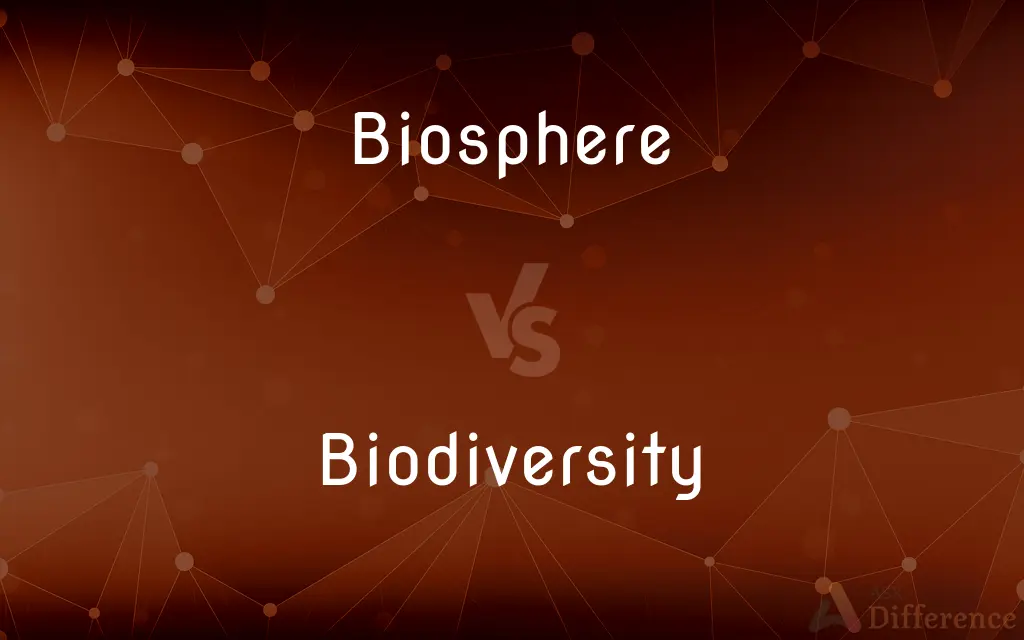Biosphere vs. Biodiversity — What's the Difference?
By Tayyaba Rehman — Updated on August 25, 2023
Biosphere refers to the Earth's living environment; biodiversity denotes the variety of life within it.

Difference Between Biosphere and Biodiversity
Table of Contents
ADVERTISEMENT
Key Differences
Biosphere encompasses all living organisms and their physical environment on Earth. Biodiversity, on the other hand, signifies the variety of those living organisms across species, genes, and ecosystems.
The biosphere is a global concept, encapsulating every environment from deep oceans to towering mountains where life exists. Biodiversity, meanwhile, highlights the richness and variety within these environments, underscoring the multiplicity of species and genetic differences.
Protection of the biosphere entails safeguarding the integrity of Earth's habitats. Conserving biodiversity is about ensuring the survival of a diverse range of species, genetic variations, and ecosystems within the biosphere.
Climate change, deforestation, and pollution threaten the stability of the biosphere. Biodiversity suffers as a direct consequence, with species extinctions and loss of genetic variability.
While efforts to maintain a healthy biosphere focus on ecological balance and sustainable practices, initiatives to preserve biodiversity prioritize the richness and complexity of life forms within the biosphere.
ADVERTISEMENT
Comparison Chart
Definition
Earth's living environment
Variety of life in an environment
Focus
All living and their physical surroundings on Earth
Diversity of species, genes, and ecosystems
Scale
Global
Can be local to global
Threats
Climate change, deforestation, pollution
Habitat loss, overexploitation, invasive species
Conservation Priority
Ecological balance and sustainability
Richness and complexity of life forms
Compare with Definitions
Biosphere
Biosphere is the sum total of all ecosystems on Earth.
Human activities are affecting the health of the biosphere.
Biodiversity
Biodiversity is a measure of ecological health.
Areas with high biodiversity tend to be more resilient to changes.
Biosphere
Biosphere represents the zone of life on Earth.
The biosphere extends from deep-sea vents to high-altitude clouds.
Biodiversity
Biodiversity indicates the variety of life forms in a given area.
Rainforests are often celebrated for their immense biodiversity.
Biosphere
Biosphere encompasses both living organisms and their environments.
The delicate balance of the biosphere is vital for sustaining life.
Biodiversity
Biodiversity encompasses species, genetic, and ecosystem diversity.
Marine biodiversity plays a critical role in global food chains.
Biosphere
Biosphere integrates land, water, and air where life exists.
Studying the biosphere helps understand Earth's complex life systems.
Biodiversity
Biodiversity supports ecosystem services like pollination and decomposition.
Loss of biodiversity can disrupt these essential services.
Biosphere
The part of the earth and its atmosphere in which living organisms exist or that is capable of supporting life.
Biodiversity
The number and variety of species found within a specified geographic region.
Biosphere
The biosphere (from Greek βίος bíos "life" and σφαῖρα sphaira "sphere"), also known as the ecosphere (from Greek οἶκος oîkos "environment" and σφαῖρα), is the worldwide sum of all ecosystems. It can also be termed the zone of life on Earth.
Biodiversity
Biodiversity is a testament to evolutionary history.
By studying biodiversity, scientists can trace patterns of evolution.
Biosphere
The living organisms and their environment composing the biosphere.
Biodiversity
(ecology) The diversity (number and variety of species) of plant and animal life within a region.
Biosphere
The part of the Earth and its atmosphere capable of supporting life.
Biodiversity
Biodiversity is the biological variety and variability of life on Earth. Biodiversity is a measure of variation at the genetic, species, and ecosystem level.
Biosphere
The totality of living organisms and their environment.
Biodiversity
The variability among living organisms on the earth, including the variability within and between species and within and between ecosystems.
Biosphere
The regions of the surface and atmosphere of the Earth (or other planet) where living organisms exist
Biodiversity
The diversity of plant and animal life in a particular habitat (or in the world as a whole);
A high level of biodiversity is desirable
Biosphere
Biosphere is interconnected and interdependent.
Changes in one part of the biosphere can impact distant ecosystems.
Common Curiosities
What does biodiversity reflect?
Biodiversity reflects the variety of life forms, including species, genes, and ecosystems.
How does climate change influence the biosphere?
Climate change can alter the biosphere by affecting temperature, weather patterns, and sea levels.
Can an area with a small biosphere have high biodiversity?
Yes, some specific areas, like isolated islands, might have a small biosphere but boast high biodiversity.
What does the biosphere comprise?
The biosphere comprises all living organisms and their physical environment on Earth.
Why is biodiversity essential for ecosystems?
Biodiversity ensures ecosystem resilience, function, and provision of services like pollination.
How does deforestation impact the biosphere and biodiversity?
Deforestation disrupts the biosphere's balance and leads to a direct loss in biodiversity.
How do humans benefit from a healthy biosphere?
A healthy biosphere provides clean air, water, food, and resources essential for human survival.
What happens if biodiversity decreases in an area?
Reduced biodiversity can lead to weaker ecosystems, loss of resources, and diminished ecological services.
Can biodiversity be restored once lost?
While some biodiversity can be restored or reintroduced, certain losses, especially extinctions, are irreversible.
How can individuals contribute to preserving the biosphere and biodiversity?
Individuals can practice sustainable living, support conservation efforts, and reduce waste to protect both the biosphere and biodiversity.
Share Your Discovery

Previous Comparison
Evenly vs. Uniformly
Next Comparison
Impulse vs. ForceAuthor Spotlight
Written by
Tayyaba RehmanTayyaba Rehman is a distinguished writer, currently serving as a primary contributor to askdifference.com. As a researcher in semantics and etymology, Tayyaba's passion for the complexity of languages and their distinctions has found a perfect home on the platform. Tayyaba delves into the intricacies of language, distinguishing between commonly confused words and phrases, thereby providing clarity for readers worldwide.












































